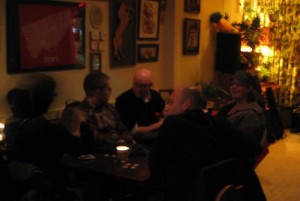In his observation of the animal world, Aristotle noted that some animals naturally flock together, while some are naturally solitary. The human animal, he observed, partakes of both characteristics. We humans thrive only if it is both the case that we can be involved in groups and if we can function as independent individuals.
This dual nature, gregarious and solitary, has implications both for our social life and for our private life.
In order to take care of our social needs, we collectively develop complex familial, cultural and political lives. It is undeniably true that there is something fundamentally fulfilling about each of these: the family life that gives us a sense of belonging, the cultural life in which we experience the enthusiasm of being with others, and the political life through which we coordinate our fulfilling of our legitimate needs and desires with others doing the same.
To take care of our needs as independent individuals, we develop personal interests, we seclude ourselves spatially to pursue study or entertainment, we adopt our own styles of fashionable dress, and we make up our own minds about how we want to handle our families, what we want to do with our friends, and what our own political views are.
The personal, the familial, the cultural and the political—all of these are essential and inherently fulfilling arenas of human life. For that reason, though, how we cultivate any of these dimensions is of central importance for the quality of our lives. Specifically, these different dimensions of life need each to be cultivated in a way that reflects the equal necessity of the others.
Because the independent ability to define ourselves individually is essential to our fulfillment, a politics that denies such individual right will always be oppressive. Equally, because belonging to a specific, non-transferable family and a specific, local community is also essential to our fulfillment, a politics that denies the right of such exclusive attachments will also always be oppressive. These points are among the most important in our political world, and are worthy of great attention.
The importance of this first principle of politics should not, however, draw our attention away from those other important domains of familial, cultural and personal life.
It is easy to think of politics as the domain of responsibility—of duties, rights and rules—while treating familial, cultural and personal life as domains in which it is nobody else’s business how we comport ourselves. This attitude, however, fundamentally misrepresents the nature of these domains.
We need a rich and vibrant social and cultural life, and so, on the one hand, we should demand of our political system and of our interpersonal relationships that they make it possible for us to have such a life. But at the same time, on the other hand, we should ask ourselves what kind of social and cultural life we seek and, especially, what vision of ourselves does our behaviour project?
 When I shop, for example, do I seek out major chain stores rather than independent entrepreneurs, and do I use the solitary internet for purchasing rather than engaging in human interaction in shared space and time? For my entertainment, am I active in my engagement with others or passive in my retreat from others, and do I seek out pre-fabricated entertainment machines or do I participate in a communal activity of making a shared event? When I socialize with my friends, do we keep our emotional lives private through an exchange of social clichés and amusing trivialities, or do we cultivate our own intimacy while jointly reflecting upon the realities of the social and political world we live in, and do we do it while dining at a chain restaurant serving generic, unhealthy entrees, or does our dining support the human cultivation of the practice of cooking?
When I shop, for example, do I seek out major chain stores rather than independent entrepreneurs, and do I use the solitary internet for purchasing rather than engaging in human interaction in shared space and time? For my entertainment, am I active in my engagement with others or passive in my retreat from others, and do I seek out pre-fabricated entertainment machines or do I participate in a communal activity of making a shared event? When I socialize with my friends, do we keep our emotional lives private through an exchange of social clichés and amusing trivialities, or do we cultivate our own intimacy while jointly reflecting upon the realities of the social and political world we live in, and do we do it while dining at a chain restaurant serving generic, unhealthy entrees, or does our dining support the human cultivation of the practice of cooking?
We can ask ourselves many such questions, and the answers will reveal something about the values we reflect in our social behaviour, the ways we do or don’t own up responsibly to the different dimensions of our human nature. In all these activities, we are dealing with other people, and these dealings involve substantial political, economic, and interpersonal structures whether we acknowledge them or not. In all these activities, too, we are also shaping ourselves individually—“feeding the soul,” so to speak. How we take up our cultural life is implicitly a way of taking up our political and personal lives as well, and we should ask ourselves whether our behaviour truly reflects this reality.
In our personal, interpersonal and familial relationships, these issues of responsibility are especially pronounced. The personal, the interpersonal and the familial domains are the areas in our lives where we are touched most intimately. We can fairly easily (but wrongly) shrug of political and cultural life as impersonal and not something we’re particularly concerned about. It is much harder to do that with our family, with our close companions or with our own emotional life.
It is a familiar truth that families and romantic relationships can be stifling. Children commonly suffer from parents (or siblings) who do not acknowledge the legitimacy of the children’s independent views or aspirations. In romance, one partner, perhaps from fear or perhaps from familiarity, can act as if she or he owns the other, becoming an enemy to the very independence of spirit that initially attracted her or him to the other. As parents and romantic partners, we should not behave in this way.
But whereas it is procedurally easy and emotionally indifferent to enact a political law making a change in some aspect of the running of our public world, it is a matter of the most intense, intimate challenge and upheaval to address our psychological vulnerabilities and become more open and trusting in our close, interpersonal dealings. These changes involve our own grappling with our private emotional lives, which is typically very difficult, and they involve addressing these issues with our intimate others, which again is typically a challenging matter. The unfortunate consequence of these psychological and interpersonal truths is that it is unlikely that most of us will make the changes we should in our close dealings, even though these are the most immediately personally important to us. It is imperative to healthy relationships and to just treatment of others that we act in a way that acknowledges and endorses the independent individuality of our family members and romantic partners, but doing this requires that we take on the difficult work of meaningful psychological and interpersonal self-criticism.
And when we do live explicitly as separate individuals—when we participate in some activity not as a family member, a spouse, or a citizen, but specifically as a private person—do we nonetheless acknowledge that those other aspects are essential to us, or do we live in denial of that? We always carry others along with us in our lives, and there is no time when this stops, but do we care for them in so doing? Do I, for example, abruptly deny the worth of my friends in order to cultivate a relationship with someone new, or, more indirectly, as I move freely in the public world, do my actions acknowledge or deny my political and economic dependence upon others in this activity.
As Aristotle says, we are both gregarious and solitary, both political and contemplative. Our healthy living, both as individuals and as a society, depends on our living each of these aspects of our lives in a way that acknowledges and supports the others.


 Participants in these
seminars consistently have the experience of growth in their conversation and
conceptual abilities, and typically leave with a transformed sense of the nature
and possibilities of philosophy.
Participants in these
seminars consistently have the experience of growth in their conversation and
conceptual abilities, and typically leave with a transformed sense of the nature
and possibilities of philosophy.





One Comment
I think you don’t understate the difficulty, unlikelihood, or importance of this kind of change. Sometimes, making even modest remedial progress seems like a task for a whole life, and I wonder at the fact that it is so hard.
Maybe it’s despair in the face of the difficulty that motivates the idea that embodiment is the sojourn of the soul in an alien and hostile realm, from which we might fondly hope someday to return to our native home. To hold fast to the truth that we are really at home in being thrown into the world, others, and the suffering of our own incarnation seems quite hard.
Practices of thinking and being together like the ones you sketch in this post are probably some of the best aid we can hope for, in that they are about making the world our home together, particularly in forging a unity out of the equally necessary but seemingly independent dimensions of our existence. So, thanks for continuing to write this sort of thing.